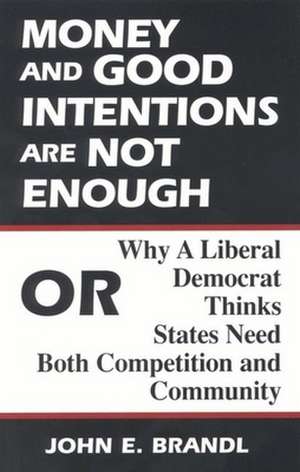Money and Good Intentions Are Not Enough: Or, Why a Liberal Democrat Thinks States Need Both Competition and Community
Autor John E. Brandlen Limba Engleză Paperback – apr 1998
State governments are spending a lot, accomplishing too little, and failing to meet their responsibilities to the public. In this book, John Brandl argues that the usual remedies for ineffective government bureaucracy--cutting or adding to budgets, urging civil servants to become more entrepreneurial, hiring tougher managers, or appointing smarter bureaucrats--won't provide substantial, long-term improvement. Examining public schools Brandl points out that although real spending per student has tripled in the last 30 years and the average class size has shrunk from 27 to 17, educational performance "has become a national disgrace." He provides alternative policies that rely on harnessing self-interest through competition and incentives and encouraging affiliations that inspire community to forge a strong connection between spending and results.
Preț: 195.25 lei
Nou
Puncte Express: 293
Preț estimativ în valută:
37.36€ • 39.01$ • 30.92£
37.36€ • 39.01$ • 30.92£
Carte tipărită la comandă
Livrare economică 05-19 aprilie
Preluare comenzi: 021 569.72.76
Specificații
ISBN-13: 9780815710592
ISBN-10: 0815710593
Pagini: 177
Dimensiuni: 152 x 229 x 13 mm
Greutate: 0.25 kg
Ediția:New.
Editura: Brookings Institution Press
Colecția Brookings Institution Press
ISBN-10: 0815710593
Pagini: 177
Dimensiuni: 152 x 229 x 13 mm
Greutate: 0.25 kg
Ediția:New.
Editura: Brookings Institution Press
Colecția Brookings Institution Press
Notă biografică
John E. Brandl, previously Deputy Assistant of the Department of Health, Education, and Welfare and a Minnesota state legislator, is interim dean of the Humphrey Institute of Public Affairs, University of Minnesota.
Descriere
State governments are spending a lot, accomplishing too little, and failing to meet their responsibilities to the public. In this book, John Brandl argues that the usual remedies for ineffective government bureaucracy--cutting or adding to budgets, urging civil servants to become more entrepreneurial, hiring tougher managers, or appointing smarter bureaucrats--won't provide substantial, long-term improvement. Examining public schools Brandl points out that although real spending per student has tripled in the last 30 years and the average class size has shrunk from 27 to 17, educational performance "has become a national disgrace." He provides alternative policies that rely on harnessing self-interest through competition and incentives and encouraging affiliations that inspire community to forge a strong connection between spending and results.







